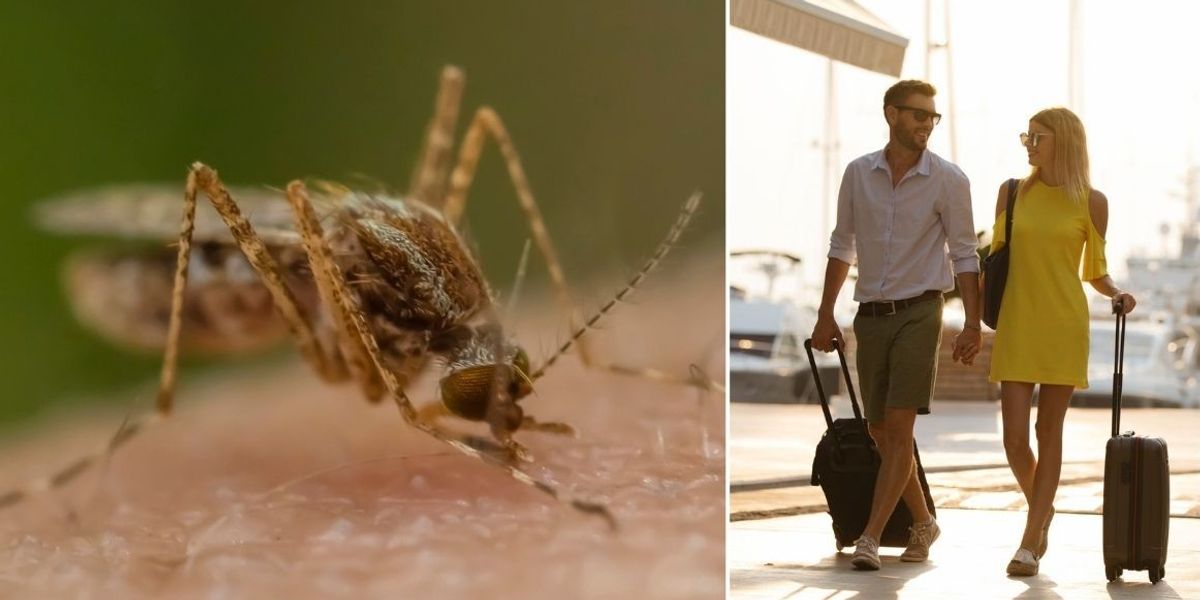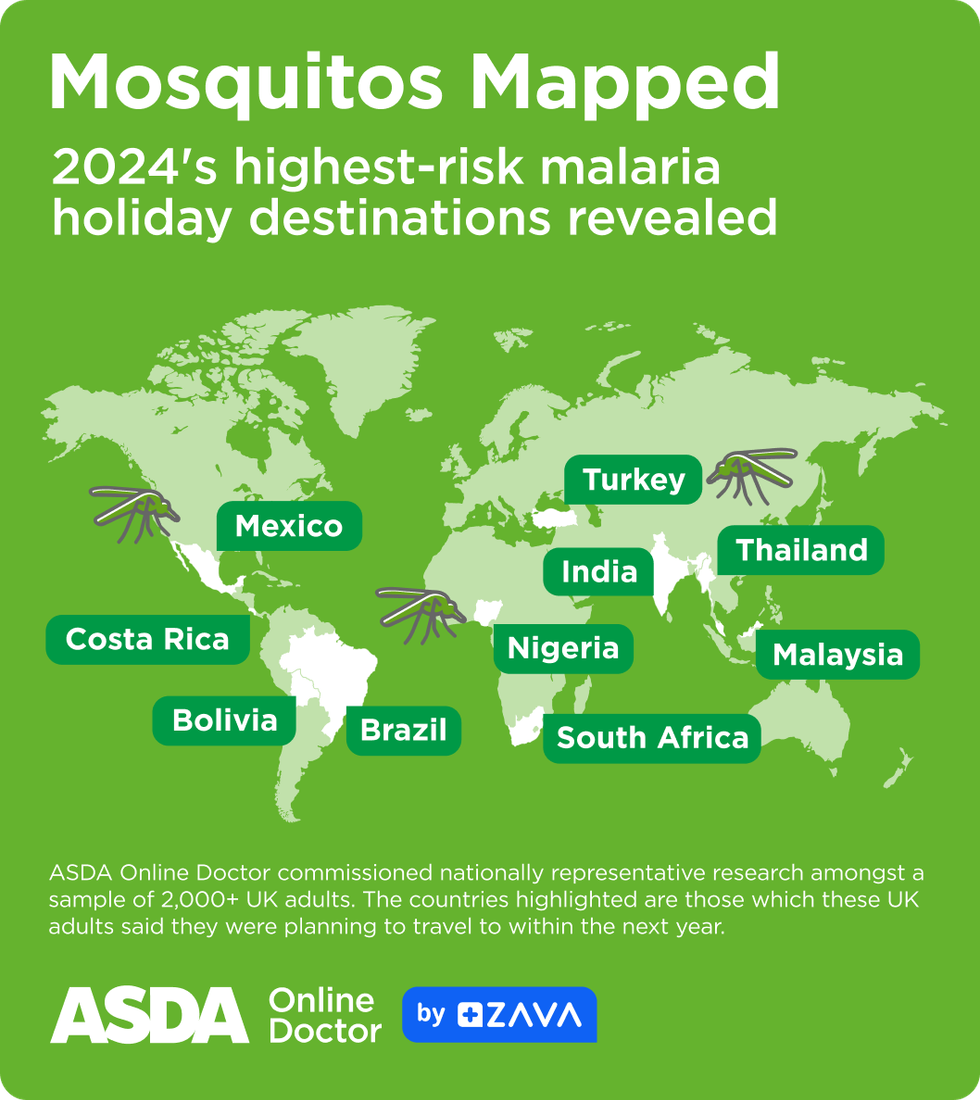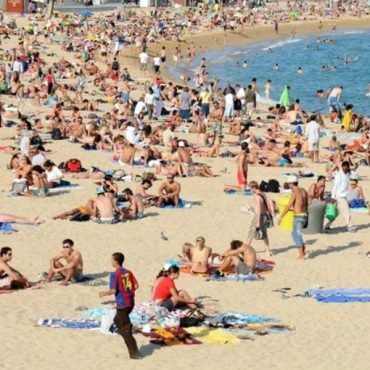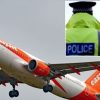Holidaymakers have been warned that one in four Britons is at risk of contracting malaria.
New research from Asda Online Doctor reveals that over a quarter (28 per cent) of UK adults – equivalent to over 15 million people – are at risk of malaria as they travel to malaria hotspots in the coming year.
The research, conducted using a sample of 2,000+ UK adults, highlighted that 2024’s highest-risk malaria holiday destinations are Mexico, Costa Rica, Bolivia, Brazil, Nigeria, South Africa, Malaysia, Thailand, India, Nigeria and Turkey.
According to the data, Turkey, Brazil and Thailand are the most popular malaria hotspots this year.

Malaria is a disease caused by a bite from an infected mosquito which transfers a parasite into the bloodstream
Asda Online Doctor
The experts at Asda Online Doctor said: “Malaria is a disease caused by a bite from an infected mosquito which transfers a parasite into the bloodstream. It is a preventable and curable disease, and it cannot be spread from person to person.
“While malaria is not found in the UK, it is common in many countries across the world. Malaria risk is higher in tropical climates where mosquitoes live, including Central and South America, Africa, South and South-East Asia and some Pacific islands.
“Britons travelling to these regions should take precautions to avoid mosquito bites and prevent malaria.”
Britons were warned that malaria can be “difficult to spot”, although the main symptoms are a high temperature, sweats and chills, headaches, fatigue, loss of appetite, nausea, vomiting and diarrhoea, muscle pains, yellow skin or whites of the eyes, a sore throat, cough and difficulty breathing.
Britons were warned: “Symptoms usually take seven to 18 days to appear after you’ve been bitten by an infected mosquito.
“Sometimes you may not have symptoms for months after travelling and in rare cases, it may be years.”
Holidaymakers travelling to destinations at risk of malaria have been advised to observe the “ABCD of malaria prevention”.
ABCD of malaria prevention
- Awareness of risk: Before travelling, check the risk of malaria at your chosen destination
- Bite prevention: Ensure you know how to avoid getting bitten by mosquitoes
- Chemoprophylaxis (antimalarial medication): Malaria tablets help to reduce the risk of contracting malaria for those who have been bitten
- Diagnosis: Those who travel to an area with a risk of malaria and develop any symptoms while abroad or up to a year after returning should seek medical attention straight away
LATEST DEVELOPMENTS

Turkey is among the popular malaria hotspots this year
GETTY IMAGES
Top tips for preventing malaria
In addition to observing the ABCD of malaria prevention, Britons should ensure they take a few key measures to increase their safety.
Check your level of malaria risk
First, holidaymakers were told to check their level of malaria risk, as this can vary a lot even within one country. Holidaymakers should also consider the time of year they are travelling, where they are staying and how long for, as well as the activities they plan to do when abroad.
Keep away from mosquitos while sleeping
Holidaymakers should also take precautions for when they are sleeping. This will mean avoiding sleeping outside or in areas where mosquitos live, like standing water or lakes. Those who are camping in tents must ensure there are no holes and doors are closed.
Indoors, travellers should ensure there is air conditioning and mosquito screens on the windows and doors. If this isn’t possible, doors and windows should be kept closed and sleep under a mosquito net that has been treated with insecticide.
Use mosquito repellent
After applying sunscreen, holidaymakers should apply a mosquito repellent that includes diethyltoluamide (DEET). This should be reapplied often, especially in the evenings.
Asda Online Doctor recommends using repellents with at least 20 per cent DEET concentration, which should last for around one to three hours. At 30 per cent DET, this protection increases to up to around six hours. For 12-hour protection, go for 50 per cent DEET.
For added protection, travellers can spray permethrin, another type of insect repellent, on their clothes.
Cover up
During both the day and night, travellers should utilise their clothing to keep them safe, opting for long-sleeved clothing and trousers that cover the skin.
Take malaria tablets
It might be necessary to take malaria tablets to help reduce the risk of contracting malaria if you’ve been bitten, depending on the particular risk level at your destination.
Britons should consult their doctor before going on holiday about getting the right malaria tablets, plus when and how to take them.
Asda Online Doctor can prescribe two forms of malaria tablets with different active ingredients, including Maloff Protect and Doxycycline.
Britons were advised: “Speak to your doctor to find out which malaria tablet is best for the country you’re visiting.”
This comes as the Foreign, Commonwealth and Development Office (FCDO) warned Britons of a disease that causes fever, chills and headache, naming the five countries with outbreaks in 2024.














Post comments (0)